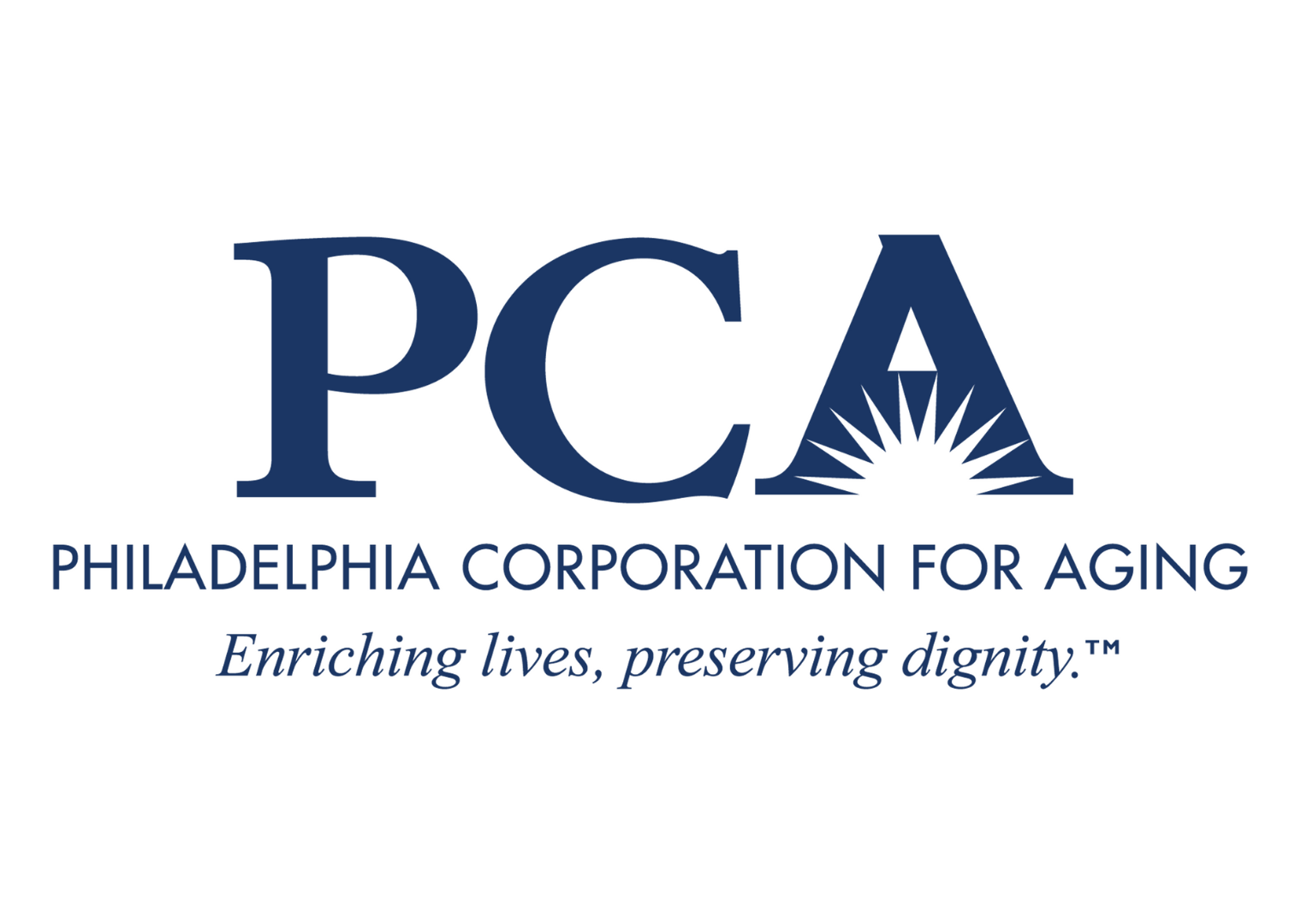Annual Budget Public Hearing Summary of Testimony and Responses
June 12, 2024 | Glenn D. Bryan, Philadelphia Corporation for Aging (PCA) board chair, welcomed everyone and explained that the hearing is intended to review key points in the fiscal year 2024-2025 proposed budget and to allow stakeholders to provide comments on the plan and budget. He expressed excitement for the 50th anniversary of PCA and looking to the future, and that we in the aging field must continue to advocate for more funding to serve older adults. Despite public funding challenges, he said we can foster equitable communities, meet and exceed needs, and devise innovative solutions. PCA President and CEO, Dr. Najja R. Orr then introduced PCA Advisory Council chair, Sandra McNally.
Ms. McNally thanked the audience for attending the budget hearing and encouraged them to share their comments and input on the presentation. She then introduced Dr. Orr.
Dr. Orr welcomed attendees and thanked them for attending PCA’s Annual Public Budget Hearing regarding programs and proposed budget for fiscal year 2024-2025. He emphasized that it is a dynamic time in aging, due, in part, to the Aging our Way, PA plan, a National Plan on Aging in the works at the federal level, and many administration changes on every level of government. He outlined some of PCA’s highlights, such as the service reach of 140,000 individuals annually, how PCA is one of the largest AAAs in the nation and offers over 30 programs. He also shared that the Governor’s proposed FY 2024-2025 budget includes an over 29 million dollar increase for aging services, the largest yearly increase ever. The proposed budget allocates millions in funding for innovative housing initiatives, the Aging Our Way, PA (AOWPA) plan, PENNCARE, PDA Alzheimer’s Disease and Related Disorders Division, and the senior center network. Dr. Orr also discussed the AOWPA plan, a 10-year, state-led and stakeholder-driven strategic plan, which was informed by listening sessions held last summer by Area Agencies on Aging (AAAs) across the state, including 17 held by PCA.
Dr. Orr shared information on PCA’s 4-year Area Plan on Aging Services, which every AAA must submit to the state and the State Plan on Aging which is submitted to the Administration for Community Living (ACL). He highlighted the diverse workforce and culture of innovation, the challenges in the city of Philadelphia and the competitive employment market, as well as the opportunity to advocate for positive updates to the Intrastate Funding Formula (IFF), which previously cut over 3 million dollars from PCA’s annual budget. After providing the attendees with updates and news around PCA and the aging network, he presented the budget. PCA’s projected expenses amount to approximately 90 million dollars including grants and other funding streams, and around 70 million dollars from City/State/Federal funding. He emphasized that PCA is always looking for ways to increase revenue to make up for flat funding while advocating for government funding to increase to appropriately meet growing needs. He then presented PCA’s projected expenses, emphasizing compliance directives to keep Long Term Care (LTC) services at a minimum of 60% of the expenses; at 64%, PCA has a very slim margin, creating challenges for example, when allocating funding to community supports like senior community centers. Dr. Orr then opened the floor to testimony from stakeholders.
Testimonies
Reneé Cunningham
Executive Director, Center in the Park
President, Board of Directors, PA Association of Senior Centers (PASC) Southeast Region
Member, Mayor’s Commission on Aging
Ms. Cunningham started by sharing her gratitude for the opportunity to provide testimony. She shared that this year she was selected to serve on the steering committee for the revision of the Intrastate Funding Formula (IFF), and commended fellow committee member Dr. Orr for his tenacity, compassion, and determination as he advocates for older adults in Philadelphia and across the state. She thanked PCA for considering concerns she raised at last year’s hearing regarding ways to improve or replace its reporting system, as this year they are waiting for the transition to CoPilot. She asks this year if PCA considers revisions to standard operating procedures, to include representatives from senior centers in the process. Next, she asked that PCA consider three ways for the senior center network to play a role in fulfilling objectives laid out in the AOWPA plan. First, a large focus in the Master Plan is technology access, digital literacy, and the ways that technology can be a tool to reduce isolation among older adults. She asks that PCA consider options for improving the technology of its senior center network. Second, the AOWPA discusses establishing “dedicated navigators” in AAAs to share information and referrals about local aging services. She urges PCA to place these community navigators within senior centers rather than at PCA, given the senior center’s demonstrated success helping people navigate the aging services network. Lastly, the AOWPA also addresses the importance of using validated tools to measure loneliness and social isolation and providing interventions to those at risk. She conveyed a desire to work with PCA on implementing a mechanism for identifying and addressing loneliness and isolation.
Additionally, she expressed interest in further conversation and resultant changes following PCA’s Weinberg Reimagining Senior Centers project, and to see a report of some kind this year. She stated that continued flat funding from the AAA forces centers, including Center in the Park, to make difficult decisions about which programs they can afford to keep and which they can no longer offer. To try to alleviate this problem, for the contract dollars they do have, she asked that PCA consider allowing flexibility in how the subcontractors utilize those funds.
Ms. Cunningham thanked PCA for improving the budget presentation compared to last year, this time including a full breakdown of projected expenses, and for hearing CIP’s testimony.
Response:
PCA thanks Ms. Cunningham for her testimony and appreciates her and her team’s contributions to helping older Philadelphians practice and maintain healthy and engaged aging. PCA also thanks Ms. Cunningham for her acknowledgement of previous improvements based on her testimony and for recognizing Dr. Orr’s contribution to the IFF revision steering committee. PCA would like to thank Ms. Cunningham for her advocacy on the IFF revision steering committee as well. PCA appreciates Ms. Cunningham’s suggestion to use the agency’s influence to seek technology access for the senior centers and will continue to explore different avenues to provide such technology. The “dedicated navigators” as described in the AOWPA plan are to be located at AAAs; they may be more appropriate for placement in senior centers, and PCA will explore this possibility with the state. With the new data management system in place, PCA would appreciate collaborating with Center in the Park to collect data on isolation risk.
Regarding the funding provided to senior centers, PCA strives to be a good steward of the resources entrusted to the agency and continuously works to improve how allocated funds are utilized. PCA looks forward to continued conversations on how to best support the senior center network. As the Weinberg Reimagining Senior Centers project is finalized, PCA will work to update the senior center network on learnings and any potential changes.
PCA thanks Ms. Cunningham for her ongoing support and partnerships. Center in the Park is a valuable resource for older Philadelphians and PCA is grateful for their tremendous work.
Q&A with Dr. Orr
During the Q&A, a staff member inquired about the IFF committee conversations, to which Dr. Orr responded that he and others are advocating strongly to correct the inequities that the previous changes inflicted on Philadelphia, and on other affected counties. A member of the public shared his opinion that legislators from Harrisburg and DC need to experience and see Philadelphia’s older adults firsthand, not just through numbers on paper. He believes older adults need to remind them that many are themselves older adults, and that they can’t forget the constituents that voted them into office. This opened a dialogue in the group, where another audience member agreed and shared a memory that PASC used to bus participants to Harrisburg to speak with legislators. Another attendee supported this sentiment, saying that we must all keep advocating, making older voices heard and demand accountability from elected officials at all levels, including in the city of Philadelphia. Dr. Orr concluded by encouraging people to share their approval of the Governor’s budget proposal to increase funding for older adult services.
Click here to download the Fiscal Year ’24-’25 Public Hearing PowerPoint presentation>>




